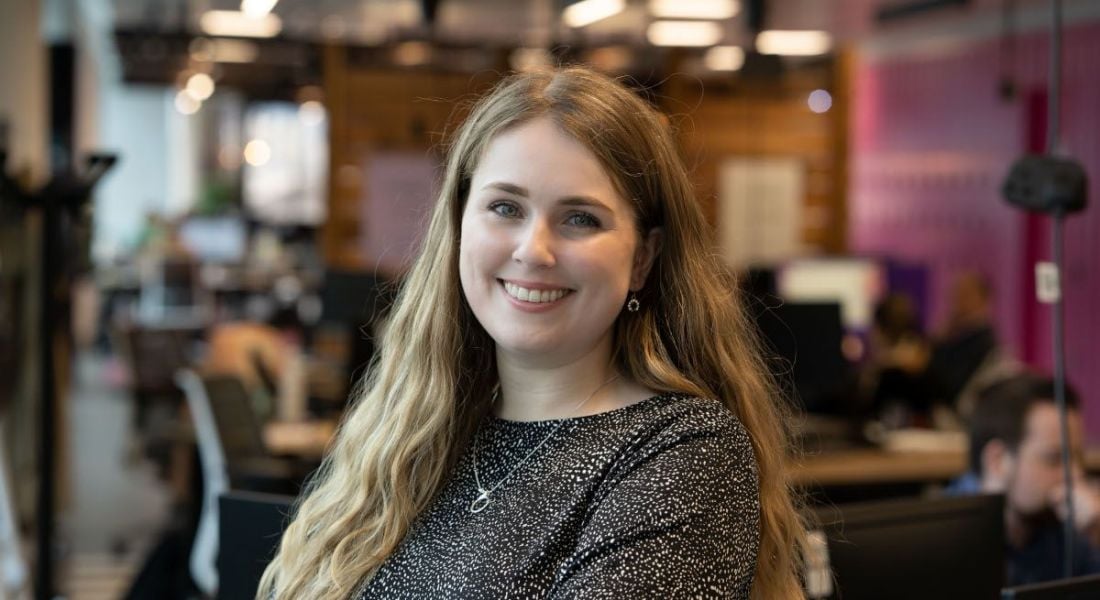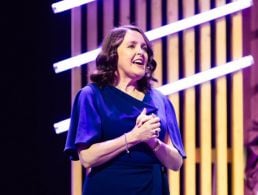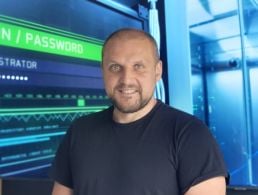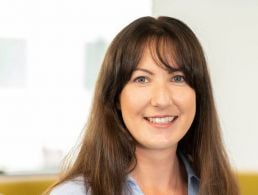Accenture’s Megan Lunney works on a wide variety of digital transformation projects in areas from finance to policing.
Megan Lunney is a commercial analyst working at The Dock, Accenture’s flagship R&D and global innovation centre based in Dublin.
She joined The Dock four years ago and has worked across a number of different areas during that time. Her current role allows her to work on digital transformation projects across a wide range of industries.
“In early-stage projects, the bulk of my day can be spent networking with colleagues who have experience in the project’s industry and interviewing users with first-hand experience. Additional time is usually spent researching the market and the need for the new product or service our team is creating,” she told SiliconRepublic.com.
“In later-stage projects, like one I am currently on, most of my time is spent working alongside my manager, taking the learnings from primary and secondary research to build out the go-to-market strategy for the solution.
“It’s important during the latter stages to dig deep get into the mindset of the client and their users, thinking through the value we can generate. This could be cutting down time, reducing costs or increasing revenue. Once we have a version of this, we then test these ideas with our subject matter experts and other stakeholders to gain feedback and iterate the commercial strategy.”
‘The problems we’re solving for aren’t always the easiest, which is part of the fun’
– MEGAN LUNNEY
What types of projects do you work on?
I’ve been fortunate to work across various industries, but recently most of my work to date has been within the public safety and public service space.
My work has been focused on total digital transformation within the industries. I had the chance to work on the development of a global public safety platform, designed to tackle the key challenges that police forces are experiencing. Currently, I am a part of a total digital transformation project within the finance space.
My last role was as a business analyst, which enabled me to strengthen my project management skills and gain first-hand experience into what it takes to deliver a new asset to market.
My current role gives me the commercial perspective and allows me the opportunity to look further than the initial market entry and focus more of the long-term vision, figuring out who, where and how to target when and why. I’m really enjoying this angle of work as it’s pushing me outside of my comfort zone!
What skills do you use on a daily basis?
My prior experience provided me a strong project management skillset that I bring in to all my tasks.
Communication is also critical to my day-to-day life. I am a chatterbox, so being able to articulate my point in the right manner to different audiences (more casual with teammates, and more concise to other stakeholders) is a skill I regularly utilise and am continuing to develop.
What is the hardest part of your working day?
If I am working from home, typically the hardest parts of the day are when I do not have anyone to bounce ideas off. A core principle of The Dock’s culture is to be continuously sharing, learning, and creating new innovations together.
During lockdown I really missed the level of physical collaboration – getting around a whiteboard and writing down 10 bad ideas until one good idea emerges is exactly up my street! It energises me and brings a level of excitement into what we can achieve.
Do you have any productivity tips that help you through the working day?
While I’m not the best at following my own advice, I truly feel getting the body moving after sitting in the same spot for a lengthy amount of time can prevent brain fog. Whenever I start to feel stiff, I love to walk around the office or apartment to help me reset and get back stuck back into work.
I also find the MS Teams MyAnalytics app good. The app keeps track of how busy my calendar is and looks for times to block out and have ‘focus time’, automatically setting my status so that I cannot be distracted by pings or calls. This has been great to not only carve out time, but also highlight when my diary is too blocked up with meetings.
Lastly, I am a huge fan of listening to music when focusing on a task. Hans Zimmer is a favourite – listen to his music from Interstellar and you’ll feel like you can conquer the world, or outer space in this reference!
When you first started this job, what were you most surprised to learn was important in the role?
When I joined the commercial strategy team it really hit home that gaining a strong understanding of the market is key to identifying how to bring the most differentiated, desired solution to life. Another thing is testing ideas is the best way to push forward.
When I first joined The Dock, the biggest surprise was the encouragement to learn something entirely out of my project and discipline. There are regular events organised so that we can learn from one another.
How has this role changed as this sector has grown and evolved?
It’s easy for people to think that a commercial strategist is only focused on building out pretty excel files with complex formulas and big figures.
I think the commercial strategy discipline has done a pretty good job in changing this narrative, highlighting the importance of understanding the market needs and buyer’s pain points from the beginning when researching a new problem area to solve.
What do you enjoy most about the job?
What I enjoy most about my job is the variety of work. I’ve had opportunities to work with small teams on early-stage strategies and large teams on bring projects to market.
I’m quite a curious (or nosy) person, so gaining opportunities to work across a variety of problems continues to keep my spark lit. The problems we’re solving for aren’t always the easiest, which is part of the fun.
I also really enjoy that when working on new propositions, the answer doesn’t have to be right straight away. In The Dock we embrace a level of what traditionally is named ‘failure’ when a proposition does not go the way we wanted for various reasons.
The chance to fail, learn and start again is a feeling I have become comfortable with and, in many cases, is the reason to thank when things go well, as I am able to grow from that experience and not place any dread when reflecting.
10 things you need to know direct to your inbox every weekday. Sign up for the Daily Brief, Silicon Republic’s digest of essential sci-tech news.




